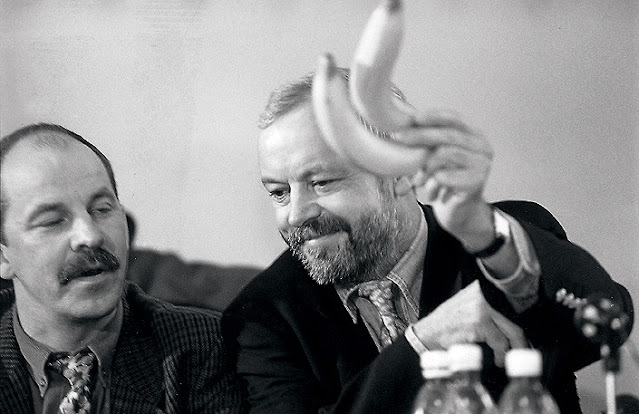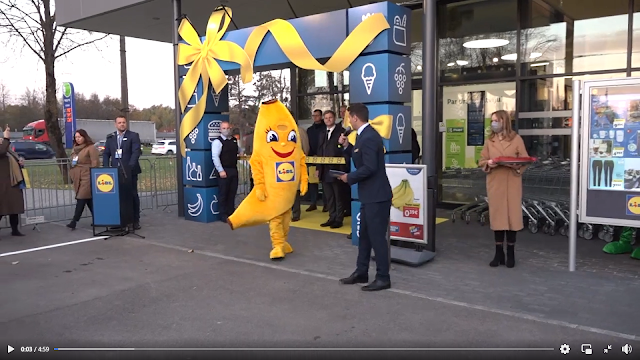MY OWN PRIVATE BANANA REPUBLIC. How the opening of Lidl showed Latvia is still stuck.
On 7 October 2021, the very first Lidl stores opened in Latvia. Known for their low prices and often average quality of products, the opening celebration was also promoted by a massive banana sale beyond any expectations. People standing in queues like crazy, Lidl's banana mascot and relatively recent, almost 30-year-old events related to buying votes for bananas - welcome to the land of not learning its lesson.
Long story short, a 'Banana republic' is a rather cynical term coined over a 100 years ago to describe usually underdeveloped countries with only few means of export, rather poor middle class and a large social gab between classes. It always comes with the oligarchy and corruption, and is usually accompanied with lack of appropriate education of the masses. Not that the term ever sounded nice, but the fact of its existence is carved in history.
In Latvian media, the "banana republic" was first used in the mid-40's, when the term was episodically, yet negatively for no reason used to simply describe the Caribbean. Starting from the mid-1950's, the communist periodicals used the term to often express their outrage toward the evil US as they would exploit the poor countries and territories in Latin America. Originally this would include Honduras (where the term was originated), Guatemala, Costa Rica, Brazil (until the sixties), and others after that. In this case, a "banana republic" would also be positively associated to states that indeed were underdeveloped, but would also rebel against the US exploitation and with political factions sympathetic to the USSR.
After the Soviet Union collapsed, it took only two years for Latvia to become a "banana republic" itself, adding some extra negative connotation to the coined term. In the summer of 1993, during the campaign for Latvia's very first democratic Saeima (parliament) election, a German-born-to-a-Latvian-father populist politician Joahims Zīgerists (Joachim Siegerist) would hand out bananas to get people vote for him and his national-conservative party LNNK.
 |
| Joahims Zīgerists (middle), bananas (right). © Dienas mediju arhīvs. |
Important to say, Latvia could have sincerely been described as a "banana country" then - underdeveloped, it lost all its major industries, the vast majority of people were poor not only according to the European standards, and the corruption and private influence on politics was on the rise. So it was only reasonable for the locals to feel helpless, tired and willing to cast a vote for a guy with a bright promise for a bunch of exotic, tasty, deficit fruits almost impossible to get during the Soviet era.
After all, a seemingly successful politician, who comes from a historically pro-Latvian family and shares some imported production left and right might seem like a person who knows what to do and could serve as a metaphor of the better days to come. Zīgerists also used the pro-Latvian and anti-Russian populism, so that made an easy shot for him on a sunny, emotional and pretty wild day of election back in 1993 (check out the 2-part video by director Elmars Cielavs below with Joahims Zīgerists appearing in the first part among people in a red sweater).
The negative connotation to "banana republic" came in when Zīgerists would actually get elected in Saeima along with many others from LNNK. Soon after he would drop out the party, skip parliament meetings, not learn Latvian language and would eventually be kicked out from Saeima. It simply proved that the "Banana republicans of Latvia" could literally be bought with a hand of bananas.
The term would then resurface now and then throughout the years. It would be usually used for describing some populist activities, the idiotism of voters, ignorance of the people toward better education, industrial and social progress, and shared responsibility. You got the idea. However, last week the "banana republic" would again return metaphorically and literally again - because of Lidl.
I am not sure who lead the campaign, but they really did some great work in depth psychology analysis. I recently found out that Lidl began in 1932 as a fruit wholesaler, so with their banana mascot, they wanted to open their stores in Latvia by returning to the roots. Therefore the massive banana sales three to four times their regular price accompanied by a the said fruit mascot.
But doing this in a post-Soviet country with some banana history, making people queue like crazy and buy boxes of fast-spoiling, tropical, not even close to necessity fruits like there's no tomorrow, and bringing back the feels of 1993 instead of 2021? This was a fantastic coincidence.
Right around the same time of opening Lidl, the whole advertisement industry went bananas as well to skim the wave and use the named fruits in ads, memes, in anything there is to lure people's attention and make them spend money. The feeling of being bought for the price of bananas was in the air, and it did not resonate well about us as a society.
The whole morning of 7 October was a perfect proof we still live in a banana country. Actually Lidl has nothing to do with it as a company, I am more than OK with another chain of stores to enter the market as it might level prices in other stores being too cozy and bring in few good alternative products. The problem here is nothing but the lack of ripeness and dignity of the Latvian society with Lidl or without.
There is a terrible saying here - if you don't feed a dog well for the first year, it will be hungry for the rest of its life. It really reminded me that many Latvians had this basic instinct impregnated in their minds after the USSR collapsed. Born and raised in a state where nothing's yours we were thrown into capitalism where you would want to own everything. Even if it is a box of some tropical delicacy with a short expiration date.
It also enlightens the issue of economical stability. It has been 30 years since Latvia gained independence, and it should have been fine by now for all of us not to worry about obscure sales, products we don't consume daily, or lining up for anything. Yet many in the country are still middle class, still relatively poor, and the level of education and social responsibility is below any comprehensive level.
But allowing yourself being bought with bananas actually has nothing to do with insufficient education, low income or post-soviet trauma. Especially when many in queues did not look desperate and arrived in advanced cars. I believe this has got something to do with self-respect. The lack of feeling that you are much better than this, you can overcome FOMO, and you are actually able to do something yourself to make your life, country, society better these days. Just don't mix it up with self-confidence. It only buys you a new Mercedes, puts you on the cover of a magazine or in the front of an antiwax or populist rally.
The irony here is - a strong sense of self-respect usually comes with around midlife crisis. So it is just normal to expect it being mistaken with self-confidence if your nation is only in its early 30s.
Mārtiņš Eņģelis
editor-in-chief
P.S. I want to clarify that this is not a commentary of any kind of those who, even after 30 years of growth and development, are still in need for cheaper goods, are socially / economically challenged, unprotected by the state. This is a critique of those thousands, who, in the same 30 years, have been unable to fight their "Buy buy buy, take, take, take, mine, mine, mine" complex. Who are ready to take up space in queues and purchase all the stuff before the poorer people can get to it. Who line up, ignoring distancing restrictions for their own safety as well as do so among those, who must not get ill because of the only work they have or the kind you cannot do from home. This is a critique of those impatient, selfish, ignorant, those full with gluttony and hate. I cannot help but think - will this ever end?

nice
ReplyDelete